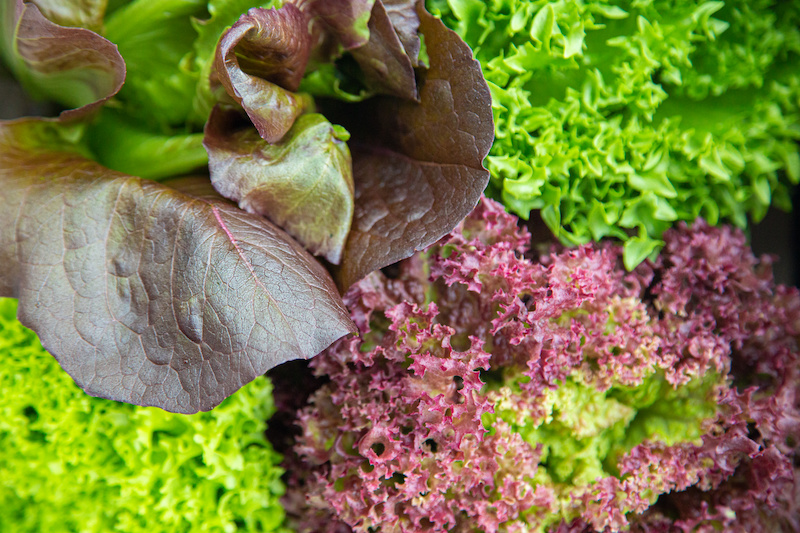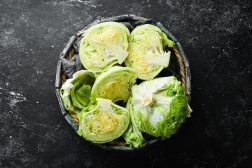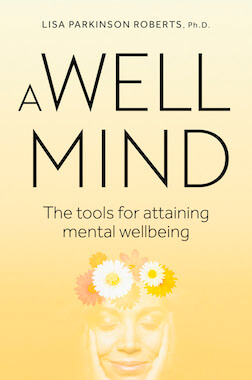Do you think they eat ice cream every day in the Arctic? This may sound a daft question but it illustrates a point that I often raise with my clients suffering from IBS and gut health troubles.
Why as a northern hemisphere nation do we eat so much cold, damp lettuce and raw salad leaves? We eat lettuce all year-round, even when it is snowing, cold and damp outside. It has become such a staple in everyone’s diet and we often reach for the the same variety, the same bag of lettuce each time too. Lettuce is just so routine it tends to pass under the radar when it comes to gut health problems. In fact, people don’t think about lettuce much at all.
Lettuce is rarely considered a possible culprit in irritable bowel syndrome and I can understand why as it seems so counter-intuitive. After all, we know that having lots of fibre is essential for digestive health and so it is a natural instinct to pack in the fibre and roughage if you experience any cramps, constipation or diarrhoea. However, if you are experiencing an Ulcerative Colitis flare-up for example, this can make symptoms worse.
Occasionally lettuce comes up as a food intolerance but more often than not this is a red herring. In gut health, it isn’t always helpful to look at food sensitivities in isolation. You need to look at context and balance, and timing as well. Small adjustments can make the world of difference.
What is it about lettuce?
There is a good reason why we don’t introduce lettuce early on when first weaning a baby onto solids: lettuce is too challenging for a baby’s developing digestive system.
We wouldn’t dream of hanging up our washing to dry in a cold and musty attic would we? Yet many of us don’t think twice about filling our overloaded digestive systems with cold and damp raw foods like lettuce. With IBS and gut health problems, it is often a case of doing some simple renovations to the attic before we move the wonderful, soft furnishings such as lettuce in.
Lettuce is healthy as part of a balanced and diverse diet. While we can’t put the bowel in a sling like we would a broken arm, we can give it a short sabbatical. We can reduce the bowel’s workload. Even a six day mini-break can do wonders.

Simple tips and timings for a happier gut
Here are just some basic tips which can help support the bowel and reduce its in-tray in the short-term to help promote recovery:
For 7-days:
- Avoid eating raw foods. Have cooked vegetables as the heating process make them easier to digest. The easiest thing is to roast a whole lot of different coloured vegetables and have any leftovers cold the next day with lunch. If you bake a potato or an apple, leave the skin.
- Avoid eating too many heavy legumes and after the seven days, have legumes more at lunch rather than in the evening. Legumes such as lentils, chickpeas, kidney and soy beans and are more heavy duty on the digestive front. Like lettuce, chickpeas (and hummus) crop up a lot with my IBS cases. You might also want to try canned legumes as these are lower FODMAP than the dried variety.
- Eat supper early (be finished by 8.30pm at the latest) and have a 14 hour overnight fast. There is a lot of scientific research into the benefits of intermittent fasting for your gut and brain health. If you eat at 6.00pm, have breakfast at 8.00am, or if at 7.00pm, breakfast at 9.00am. For more useful advice, I recommend Jeannette Hyde’s new book, the ’10-Hour Diet’. That book is also the subject of my next blog.
- Drink more water. So much constipation and diarrhoea is connected to dehydration. So is hunger often.
- Eat breakfast, lunch and supper at the same time as much as possible. The gut is a stickler for routine and finds change unsettling.
- Aim for an optimum 8 hour sleep and sleep on your left hand side.
After the seven days and for the longer-term, it is best to eat raw foods at breakfast or at lunch. Who wants all that cold, damp food festering in their gut overnight when it wants to be resting and recuperating? Some of the best advice I once received was at the Original FX Mayr: they advise ‘no raw food after 2.00pm’. They also encouraged an overnight fast. My own cut-off time for raw food is 4.00pm and of course, there are always exceptions to this rule. However, it’s what you do 80% of the time that can make a huge difference.

Be more attuned to the environment, your location, external temperature and the time of year. Warming foods are more beneficial during the colder months. Eat foods in season as much as possible. Then, when you do eat lettuce, why stick to the same old Iceberg or Little Gem? There are so many varieties of lettuce, a vast array of different plants and leaves to enjoy. I encourage you to eat as many different plants, leaves, shoots and roots as possible. Explore all the different colours, flavours and textures available. The worst thing we can do is eat the same old foods every day. There is so much research now to show that it is in eating a varied diet, rich in diverse plants, that we really improve our gut and overall health. Your good bacteria, so key to immunity and weight management, will be sure to have a field day!
For more information or to book a nutrition consultation, contact Charlotte Fraser at enquiries@naturopathic-nutrition.com.




